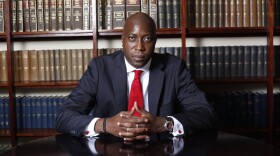ST. THOMAS – The commissioner of the Virgin Islands Department of Licensing and Consumer Affairs, alongside the Virgin Islands government, has filed a civil lawsuit against two of the world’s largest beverage companies and their local affiliates for their role in the territory’s plastic pollution crisis.
“The commissioner and government are bringing this lawsuit to hold defendants accountable for their role in the plastic crisis that is overwhelming the Virgin Islands,” the complaint, which was filed in the Superior Court of the Virgin Islands on April 11, states.
The lawsuit accuses The Coca-Cola Company, PepsiCo Inc., PepsiCo Caribbean Inc., and CC One Virgin Islands of causing and then profiting off widespread plastic pollution, while leaving the environmental, public health, and financial burden on the people of the Virgin Islands.
“Pepsi and Coca-Cola — the top plastic polluters in the world — have littered the Virgin Islands with their plastic bottles and engaged in a disinformation campaign to make consumers falsely believe that purchasing their products in single-use plastic bottles is an environmentally responsible choice,” the lawsuit states.
It alleges all four defendants created a public nuisance by polluting public spaces and endangering health and ecosystems in the Virgin Islands, arguing that the environmental and public health burden caused by unrecycled plastic is disproportionately high due to the territory’s limited landfill space, fragile marine ecosystems, and reliance on tourism.
According to a 2019 waste study conducted by the University of the Virgin Islands, and cited in the lawsuit, plastic made up 21% of solid waste on St. Thomas, with plastic beverage bottles among the most common items.
“The Virgin Islands is facing a waste management crisis due, in part, to the explosion of single-use plastic products-like defendants’ single-use plastic bottles,” the lawsuit states. “The Virgin Islands’ two operational landfills were supposed to shut down in 2018 and 2019, respectively, pursuant to an agreement with the federal government but have continued to operate out of necessity. However, these landfills will likely be out of space by 2028, which leaves the Virgin Islands with only a handful of extremely costly options.”
The lawsuit seeks a permanent injunction to stop both companies from continuing those practices and asks the court to order them to return any profits made as a result of the violations. Officials also want the court to impose the maximum civil penalties allowed by law, require both companies to help clean up the plastic pollution they allegedly caused, and pay for attorneys’ fees and other legal costs.
“Defendants, in falsely marketing and purposefully manufacturing, bottling, and selling excessive amounts of beverages packaged in single-use plastic bottles without implementing or paying for an environmentally responsible way to dispose of them, have shifted the burden of dealing with plastic waste on to the government and people of the Virgin Islands,” the lawsuit states.
The first two counts of the lawsuit, which are only against The Coca-Cola Company and PepsiCo Inc., accuse the companies — both of whom are among the top plastic polluters globally — of deliberately contributing to a plastic pollution crisis in the territory while deceiving consumers about the recyclability and safety of their products.
“PepsiCo and Coca-Cola both are members of a number of organizations that push false solutions to the plastic crisis while maintaining profits and the status quo for the plastics industry,” the lawsuit states. “Despite PepsiCo’s and Coca-Cola's awareness of the limits of recycling as a solution to the plastic pollution crisis, they have routinely and consistently portrayed recycling as a practical solution.”
Count I alleges the two companies engaged in deceptive marketing practices, including overstating recyclability, downplaying health and environmental risks, and failing to disclose microplastic contamination, therefore violating the Consumer Protection Law of 1973. Count II takes these claims a step further, alleging these companies of intent to defraud by promoting false sustainability claims and failing to warn of the true impact of their packaging, in violation of the Consumer Fraud and Deceptive Business Practices Act.















